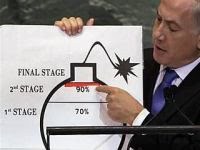Netanyahu growls at the UN against Iran
The Prime Minister of Israel, Benjamin Netanyahu, gave the expected speech at the UN General Assembly, which was filled with threats against Iran and the rejection of any peace initiative in the Middle East. Netanyahu tried to raise the tone and proposed the establishment of a "red line" to contain the Iranian nuclear project.

The Prime Minister of Israel, Benjamin Netanyahu, gave the expected speech at the UN General Assembly, which was filled with threats against Iran and the rejection of any peace initiative in the Middle East.
Netanyahu tried to raise the tone and proposed the establishment of a "red line" to contain the Iranian nuclear project. Paraphrasing the Rabbit, from Alice in Wonderland, he repeated: "It's getting late, too late" to aggressively contain Iran. This is an obsession that has resulted in further complaints against the campaign for recognition of the Palestinian state.
Netanyahu shook the ghost, suitable for the fearful conservative minds of the west, afraid of Iran handing nuclear weapons to terrorists. Justified with these repeated absurd allegations in a speech that was aggressive, that does not even find absolute consensus within his government, there are faces of resistance from some sectors, as evidenced recently with the leak to the press on the intimate debates of the Israeli administration.
But he insists, threatening: "Faced with a clear red line, Iran will give in," saying that the "future of the world is at stake."
The government in Tehran has repeatedly assured the peaceful purpose of its nuclear program, while Israel, the United States and European Union accuse the country of having a goal to build a nuclear arsenal. They move hard and conduct a threatening campaign against Iran, only it has not translated into actions of aggression against the country due to various factors. Among them the resistance of some large nations like Russia, China and Brazil, and the growing (conventional) military capability that Iran has demonstrated in successive tests and training maneuvers.
Another factor that cannot be overlooked, is the international isolation of Israel, and Netanyahu in particular. Isolation flagged by the coldness with which he was treated, this trip to New York for Barack Obama (did not made room in his schedule to meet with him), and also by the ovation with which the Palestinian leader, Mahmud Abbas, was welcomed to speak at the General Assembly and propose the recognition of Palestine as a state (non-member) of the UN.
Netanyahu acts like a street fighter willing to deliver ultimatums to terrorize his opponents. And he received, somehow, a public reprimand from the Secretary of Defense, Leon Panetta, who recently justified his opposition to an ultimatum against Iran noting that heads of state do not act this way, they can also turn against the author of the threat.
The rhetoric from the U.S., just over a month before the November presidential election that will determine the fate of President Obama, has been ambiguous versus an opponent with considerable firepower and responsiveness whose effects can spread around the world. An example is the real threat, the closing the Strait of Hormuz as a result of an attack on Iran, that would dig further into the economic hole that rich countries, especially, are measured.
Still, the speech of Barack Obama, on Tuesday (25th), at the same General Assembly that had just heard Netanyahu, was also threatening. Although opposed to the imposition of an ultimatum against Tehran, Obama, who made overtures to the Arab world, in some ways anticipated the content of the speech of the Prime Minister of Israel, saying that the time for Iran to cooperate "is not unlimited."
The speeches in the General Assembly are made by heads of state before heads of state, and are a barometer of the world situation. In this sense, the pronouncement of the Tel Aviv leader did not innovate, but it confirms an aggressive arrangement, in defense of their own oppressive policies against the Palestinians and against the peoples of the Middle East, which does not retreat in the face of a much greater threat, the threat of a widespread armed conflict that can result from an attack against Iran
Translated from the Portuguese version by:
Lisa Karpova
Pravda.Ru
Subscribe to Pravda.Ru Telegram channel, Facebook, RSS!


